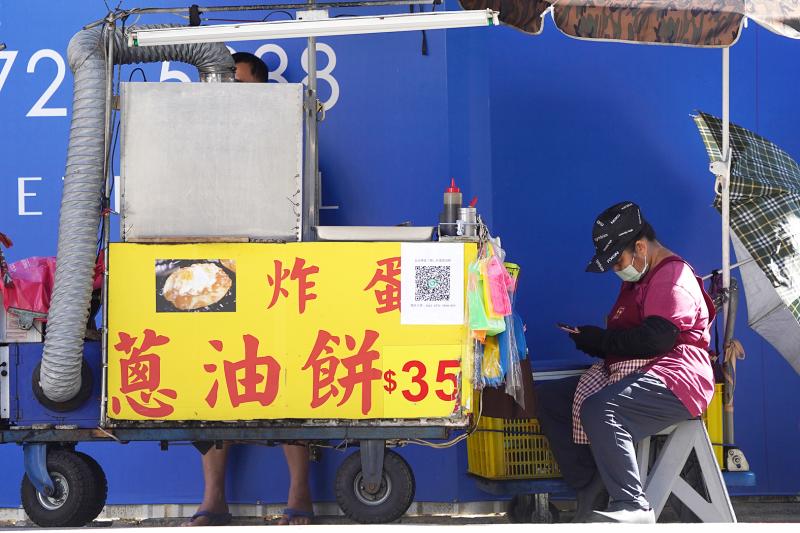The Ministry of Economic Affairs (MOEA) yesterday said it would give out 4 million vouchers worth NT$500 each that could be used only in restaurants, as well as at night markets, food vendors and gift shops, aiming to help small businesses that were affected by the COVID-19 pandemic.
The vouchers would only be available to Taiwanese who use the digital version of the Quintuple Stimulus Vouchers,” the ministry said.
The Triple Stimulus Vouchers issued in July last year were claimed by the overwhelming majority of Taiwan’s residents.

Photo: CNA
However, most opted for the paper version, with only 1.78 million people choosing the digital option.
The government is seeking to raise that number, Department of Commerce head Su Wen-ling (蘇文玲) said.
“We want more people to use the digital vouchers for multiple reasons: It reduces administrative costs, lowers the risk of spreading COVID-19 and increases the share of people using digital payments, which is a goal of the government,” Su said.
The ministry’s vouchers would be given out on a first-come-first-served basis to 4 million people who sign up for the digital Quintuple Stimulus Voucher program.
Half of the voucher budget comes from the ministry’s stimulus funds, while the other half was donated by Formosa Plastics Group (台塑集團).
The vouchers can only be used in restaurants and at individual vendors, including bakeries and dessert stores, but not at supermarkets or convenience stores, Su said.
“More than 99 percent of restaurants and other food vendors are small and medium-sized businesses, or even micro vendors,” Su said. “They have been disproportionately hit by the COVID-19 outbreak this year, and we are trying to direct more help toward them.”
The ministry has been working with hawkers and food stalls at night markets so that they can receive digital payments from services such as Line Pay or Jkopay Co Ltd (街口支付).
“We will announce other incentives on a rolling basis to encourage the public to use digital vouchers,” Su said.
“Since last year’s Triple Stimulus Vouchers, we have worked to make it even easier to do so,” Su added.

TAKING STOCK: A Taiwanese cookware firm in Vietnam urged customers to assess inventory or place orders early so shipments can reach the US while tariffs are paused Taiwanese businesses in Vietnam are exploring alternatives after the White House imposed a 46 percent import duty on Vietnamese goods, following US President Donald Trump’s announcement of “reciprocal” tariffs on the US’ trading partners. Lo Shih-liang (羅世良), chairman of Brico Industry Co (裕茂工業), a Taiwanese company that manufactures cast iron cookware and stove components in Vietnam, said that more than 40 percent of his business was tied to the US market, describing the constant US policy shifts as an emotional roller coaster. “I work during the day and stay up all night watching the news. I’ve been following US news until 3am

UNCERTAINTY: Innolux activated a stringent supply chain management mechanism, as it did during the COVID-19 pandemic, to ensure optimal inventory levels for customers Flat-panel display makers AUO Corp (友達) and Innolux Corp (群創) yesterday said that about 12 to 20 percent of their display business is at risk of potential US tariffs and that they would relocate production or shipment destinations to mitigate the levies’ effects. US tariffs would have a direct impact of US$200 million on AUO’s revenue, company chairman Paul Peng (彭雙浪) told reporters on the sidelines of the Touch Taiwan trade show in Taipei yesterday. That would make up about 12 percent of the company’s overall revenue. To cope with the tariff uncertainty, AUO plans to allocate its production to manufacturing facilities in

Six years ago, LVMH’s billionaire CEO Bernard Arnault and US President Donald Trump cut the blue ribbon on a factory in rural Texas that would make designer handbags for Louis Vuitton, one of the world’s best-known luxury brands. However, since the high-profile opening, the factory has faced a host of problems limiting production, 11 former Louis Vuitton employees said. The site has consistently ranked among the worst-performing for Louis Vuitton globally, “significantly” underperforming other facilities, said three former Louis Vuitton workers and a senior industry source, who cited internal rankings shared with staff. The plant’s problems — which have not

COLLABORATION: Given Taiwan’s key position in global supply chains, the US firm is discussing strategies with local partners and clients to deal with global uncertainties Advanced Micro Devices Inc (AMD) yesterday said it is meeting with local ecosystem partners, including Taiwan Semiconductor Manufacturing Co (TSMC, 台積電), to discuss strategies, including long-term manufacturing, to navigate uncertainties such as US tariffs, as Taiwan occupies an important position in global supply chains. AMD chief executive officer Lisa Su (蘇姿丰) told reporters that Taiwan is an important part of the chip designer’s ecosystem and she is discussing with partners and customers in Taiwan to forge strong collaborations on different areas during this critical period. AMD has just become the first artificial-intelligence (AI) server chip customer of TSMC to utilize its advanced